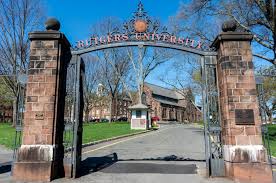Standing proudly on the banks of the Raritan River in New Jersey, Rutgers University embodies a rich tapestry of tradition and innovation. Founded in 1766 as Queen’s College, Rutgers is the eighth-oldest institution of higher learning in the United States and the largest university in the state of New Jersey. This article delves into the core values that define Rutgers, exploring its unwavering commitment to access and affordability, its dedication to public service, and its diverse academic offerings that cater to a wide range of students and aspirations.
A Beacon of Opportunity for All
From its inception, Rutgers University has embraced a mission of inclusivity and accessibility. Founded as a colonial college, it was the first institution in the American colonies to accept students from all religious denominations. Today, Rutgers remains committed to providing a high-quality education at an affordable price, attracting a diverse student body from various backgrounds and socioeconomic realities.
The university boasts a robust financial aid program, ensuring that talented students have the opportunity to pursue their academic dreams regardless of financial constraints. Additionally, Rutgers offers a variety of online and part-time programs, catering to the needs of working professionals and non-traditional students seeking to further their education.
This commitment to access fosters a vibrant intellectual environment where students from diverse backgrounds can learn from and challenge each other’s perspectives. Rutgers’ campuses, spread across New Brunswick, Newark, and Camden, reflect the university’s dedication to serving the people of New Jersey, creating hubs of learning and opportunity in various regions of the state.
A University Rooted in Public Service
Rutgers University recognizes that its responsibility extends beyond the walls of its classrooms and laboratories. The university has a long and distinguished history of public service, actively contributing to the social and economic well-being of the state of New Jersey and beyond.
The Rutgers Cooperative Extension Service, established in 1864, exemplifies this commitment. This outreach program provides educational resources and technical assistance to farmers, families, and communities across New Jersey, promoting agricultural sustainability, healthy living, and youth development.
Rutgers faculty and students are actively engaged in tackling critical issues facing New Jersey and the wider world. Researchers in fields like environmental science and engineering work on solutions to climate change and environmental degradation. Public policy experts contribute to the development of solutions for issues ranging from education reform to healthcare access.
This unwavering dedication to public service ensures that Rutgers’ research and knowledge have a tangible impact on the lives of people beyond the academic realm. The university fosters a culture of social responsibility, encouraging students to utilize their academic skills to address real-world challenges and contribute to positive societal change.
A Universe of Knowledge Under One Roof
Rutgers University offers a vast and comprehensive array of academic programs across its various schools and colleges. From the esteemed Rutgers College, offering a traditional liberal arts education, to the prestigious Rutgers Business School and the Rutgers Robert Wood Johnson Medical School, the university caters to a wide range of student aspirations and academic interests.
This breadth of offerings allows students to explore diverse fields of study before settling on a major. Additionally, Rutgers fosters interdisciplinary learning through various programs and initiatives. Students can combine their chosen major with courses from other disciplines, ensuring a well-rounded education that prepares them for the complexities of the modern world.
The university also boasts a vibrant research environment, with faculty and students pushing the boundaries of knowledge across diverse fields. Rutgers is consistently ranked among the top research universities in the United States, with research centers dedicated to fields like materials science, human genetics, and artificial intelligence. This research focus allows undergraduates to participate in cutting-edge projects alongside renowned faculty, gaining valuable research experience.
Cultivating Leaders for a Changing World
Rutgers University recognizes that its graduates are not simply entering the workforce; they are becoming the leaders and innovators of tomorrow. The university fosters a culture of leadership development and career preparation, equipping students with the skills and knowledge necessary to thrive in their chosen fields.
Career services programs provide students with guidance on resume writing, interview skills, and job search strategies. Additionally, Rutgers offers a variety of internship and experiential learning opportunities, allowing students to gain practical experience while still in school.
Rutgers’ alumni network embodies this dedication to leadership and innovation. From renowned scientists and CEOs to policymakers and social activists, Rutgers graduates have gone on to make significant contributions in diverse fields. Their success serves as a testament to the university’s commitment to fostering well-rounded, engaged citizens who are prepared to shape a brighter future.
A Legacy That Continues to Grow
As Rutgers University embarks on its next chapter, it does so with a rich legacy of accessibility, public service, and a comprehensive academic offering. The university remains committed to providing a high-quality education at an affordable price, fostering a diverse and vibrant intellectual environment. With its unwavering dedication to research and public service, Rutgers University is certain to continue its
